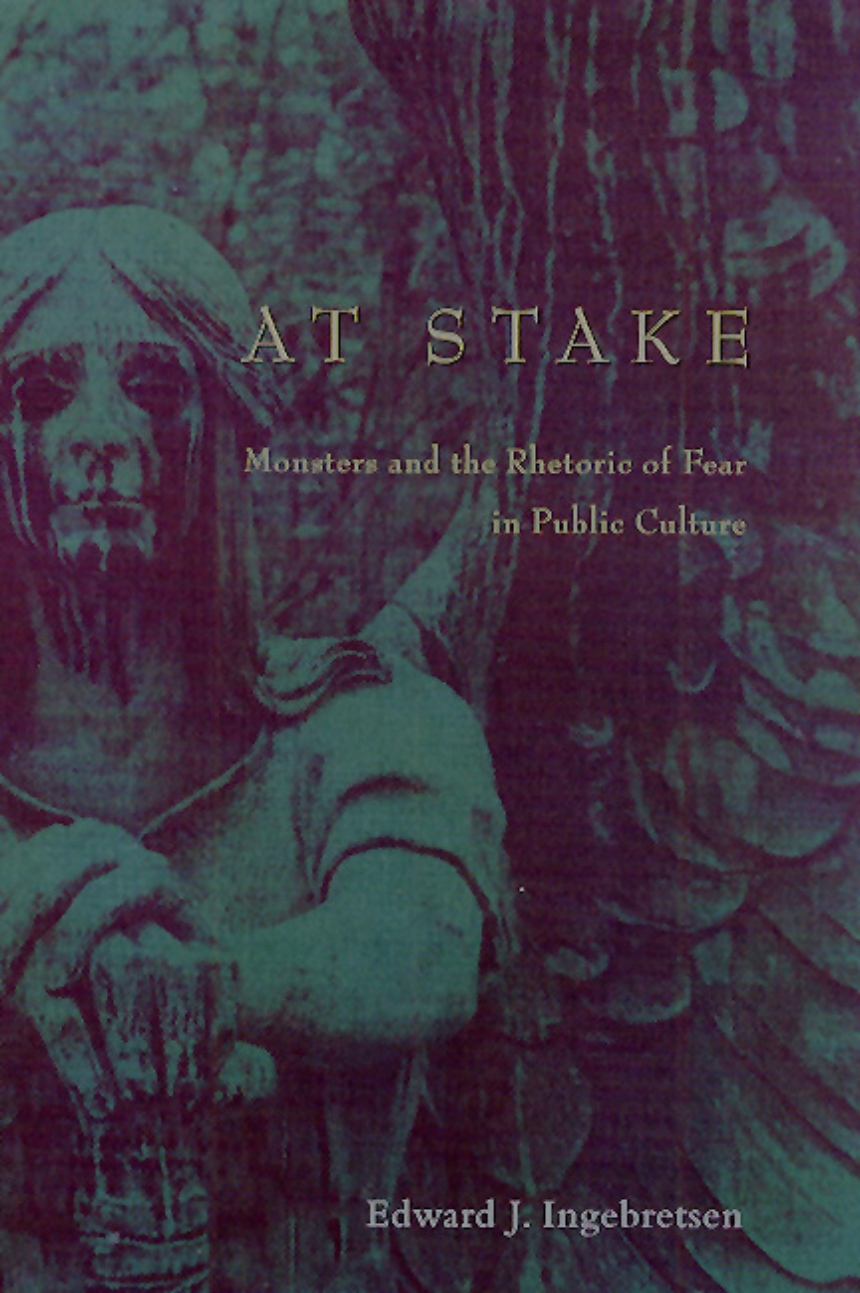At Stake
Monsters and the Rhetoric of Fear in Public Culture
Anyone who reads the papers or watches the evening news is all too familiar with how variations of the word monster are used to describe unthinkable acts of violence. Jeffrey Dahmer, Timothy McVeigh, and O. J. Simpson were all monsters if we are to believe the mass media. Even Bill Clinton was depicted with the term during the Monica Lewinsky scandal. But why is so much energy devoted in our culture to the making of monsters? Why are Americans so transfixed by transgression? What is at stake when the exclamatory gestures of horror films pass for descriptive arguments in courtrooms, ethical speech in political commentary, or the bedrock of mainstream journalism?
In a study that is at once an analysis of popular culture, a polemic on religious and secular rhetoric, and an ethics of representation, Edward Ingebretsen searches for answers. At Stake explores the social construction of monstrousness in public discourse-tabloids, television, magazines, sermons, and popular fiction. Ingebretsen argues that the monster serves a moralizing function in our culture, demonstrating how not to be in order to enforce prevailing standards of behavior and personal conduct. The boys who shot up Columbine High School, for instance, personify teen rebellion taken perilously too far. Susan Smith, the South Carolinian who murdered her two children, embodies the hazards of maternal neglect. Andrew Cunanan, who killed Gianni Versace, among others, characterizes the menace of predatory sexuality. In a biblical sense, monsters are not unlike omens from the gods. The dreadful consequences of their actions inspire fear in our hearts, and warn us by example.
In a study that is at once an analysis of popular culture, a polemic on religious and secular rhetoric, and an ethics of representation, Edward Ingebretsen searches for answers. At Stake explores the social construction of monstrousness in public discourse-tabloids, television, magazines, sermons, and popular fiction. Ingebretsen argues that the monster serves a moralizing function in our culture, demonstrating how not to be in order to enforce prevailing standards of behavior and personal conduct. The boys who shot up Columbine High School, for instance, personify teen rebellion taken perilously too far. Susan Smith, the South Carolinian who murdered her two children, embodies the hazards of maternal neglect. Andrew Cunanan, who killed Gianni Versace, among others, characterizes the menace of predatory sexuality. In a biblical sense, monsters are not unlike omens from the gods. The dreadful consequences of their actions inspire fear in our hearts, and warn us by example.
355 pages | 6 x 9 | © 2001
Culture Studies:
History: American History
Literature and Literary Criticism: General Criticism and Critical Theory
Political Science: Classic Political Thought
Religion: American Religions
Reviews
Table of Contents
Acknowledgments
Prologue: What the Angle Said
Introduction: Thinking about Monsters
1Gothic Returns: Haunts and Profits
2Drive-by Shouting
3Redressing Andrew: Cunanan’s Killing Queerness
4Susan Smith: When Angels Fall
5Reading the Starr: Scandal and Auguries
6Death by Narrative
7Sacred Monster: Matthew Shepard
Coda: Common Weal, Common Woe
Notes
Selected Bibliography
Index
Prologue: What the Angle Said
Introduction: Thinking about Monsters
1Gothic Returns: Haunts and Profits
2Drive-by Shouting
3Redressing Andrew: Cunanan’s Killing Queerness
4Susan Smith: When Angels Fall
5Reading the Starr: Scandal and Auguries
6Death by Narrative
7Sacred Monster: Matthew Shepard
Coda: Common Weal, Common Woe
Notes
Selected Bibliography
Index
